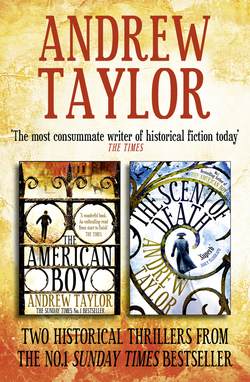Читать книгу Andrew Taylor 2-Book Collection: The American Boy, The Scent of Death - Andrew Taylor, Andrew Taylor - Страница 47
35
ОглавлениеIn the morning, I had time to call at Mr Rowsell’s chambers in Lincoln’s Inn. It seemed churlish to be so close to him and not to pay him a visit; and I wished to say farewell and send my apologies to Mrs Rowsell. He welcomed me with his customary good humour and sent out Atkins, his clerk, for coffee.
His face lengthened, however, when I told him where I was going.
“I cannot pretend I like this plan, Tom,” he said, “though of course it is no concern of mine. But the children will miss you sorely on Saturday. Is Mr Bransby happy to see you go?”
“He is disposed to consider that on the whole the advantages outweigh the drawbacks.”
Rowsell nodded. “There are financial considerations, no doubt, and he would be fully alive to their importance. How long do you stay?”
As I was answering him, there was a knock at the door and Atkins ushered in the boy with the tray. The clerk glanced at me with tiny eyes like specks of mud and averted his round, pale face. Rowsell sat in silence until we were alone. I knew him well enough to apprehend that he was not easy in his mind. I thought his solicitude as misplaced as Dansey’s.
He poured the coffee and handed me a cup. “You remember we were discussing Mr Carswall and Mr Frant’s conduct in the late war with America?”
“Why, yes, sir.”
“I was in the City the other day and I heard another story about Wavenhoe’s that I did not altogether like. In fairness, it may be no more than a story. But it came from more than one source, so I suspect there may be some truth in it.” He tasted his coffee and screwed up his face. “It concerns what precipitated this entire ugly affair – the collapse of the bank, that is, the discovery of Mr Frant’s criminal dealings and his eventual murder. It appears that the bank was liable for certain bills, amounting together to a considerable sum, that became due at the end of October. Most of them concerned building speculations in which the bank had invested.”
I nodded, for Miss Carswall had told me something of this when she waylaid me in Stoke Newington. “There was no money to pay them?”
“That was not in itself the difficulty. In the normal run of things, Frant could quite reasonably expect to negotiate extensions to the terms of the bills. However, it appears that a few weeks before the debts became due, a number of the bills changed hands. They were purchased by a commercial house which often acts as a go-between in transactions where the principal does not wish to have his name known. At the end of the month, these bills were presented for payment, and Frant found he could not negotiate extensions to any of them.”
“So you believe that an enemy of Mr Frant’s may have contrived his ruin?”
“Not contrived, not exactly – that’s putting it too strong. Frant’s corrupt dealings made the bank’s eventual downfall inevitable. No, if true, what this circumstance suggests to me is that the collapse of the bank may have been brought forward, perhaps by several weeks, or even months.”
Rowsell paused to pour us more coffee.
“What would be the advantage in that?” I asked.
“At this point we cannot tell. But in order to put into effect such a scheme, a man would need to have the command of considerable wealth, and also to regard Mr Frant with inveterate malignancy. Why else would one buy control of the debts of a failing concern? On the face of it, the scheme’s success would involve its perpetrator in considerable financial loss. Since Wavenhoe’s closed its doors, those bills are hardly worth the paper they are written on.”
“Aye,” I said. “I see what you are driving at, sir.”
“Not what,” Mr Rowsell said, spreading out his arms so vigorously that a few drops of coffee flew out of his cup and splattered in an arc of black spots on the floor. “Who.”
“Oh. You – you cannot mean Mr Carswall?”
Demure as a maiden, he looked at me over the brim of the tiny cup. His big pink face was empty of guile, empty of all emotions except a generalised benevolence and a mild curiosity.
